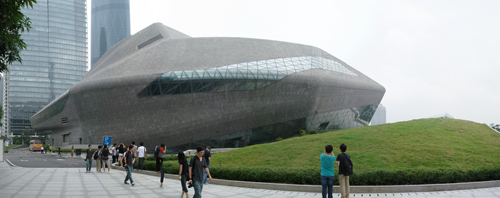 Guangzhou Opera House. Photo by puikincz
Guangzhou Opera House. Photo by puikincz
You gotta give Guangzhou some credit. The capital city of Guangdong Province is trying desperately hard to catch up to its first tier city peers in the culture department. The city’s inferiority complex manifested itself most recently in the over-the-top production of the 2010 Asian Games – an event reminiscent of the 2008 Beijing Olympics but hardly as noteworthy.
Now Guangzhou is looking to capture the spotlight once again with a spectacular opera house designed by Zaha Hadid, set to open to the public in February. This isn’t the first time striking architecture by a world-famous designer has been used to raise the profile of a city.
Yet why does Guangzhou, the capital of China’s wealthiest and most populous province need to rely on name brand architecture to raise its profile? The city has a rich history and a strong culinary tradition. And because Guangdong is where many Chinese immigrants around the world come from, the Cantonese culture is the main window through which foreigners have come to know China.
Guangzhou officials should be promoting its unique cultural heritage if it wants to attract tourism. The eye-catching imagery of avant-garde architecture is not a long-term sustainable strategy for doing this. Liu Xiaolu, spokesman for the Opera, confirmed the misguided intent of this project:
“In a short period of time it has changed the cultural scene here, which was relatively limited until recently. Before it was just Beijing and Shanghai. Major international productions – whether it was opera or pop music – would pass right over us and go straight to Hong Kong. We just didn’t have the venues. We didn’t even have a stage large enough to fit all the swans in Swan Lake. Now it’s Guangzhou’s turn.“
Domus: Zaha Hadid in Guangzhou
ArchDaily: Guangzhou Opera House/Zaha Hadid


by Adam Mayer